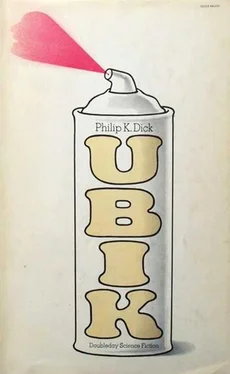“And say what?” Tippy Jackson asked.
“Just fill out the coupon,” Al said. To Edie Dorn he said, “Are you absolutely sure you’ve had that matchfolder in your purse since late last week? Or could you have picked it up somewhere today?”
Edie Dorn said, “I put several matchfolders into my purse on Wednesday. As I told you, this morning on my way here I happened to notice this one as I was lighting a cigarette. It definitely has been in my purse from before we went to Luna. From several days before.”
“With that ad on it?” Jon Ild asked her.
“I never noticed what the matchfolders said before; I only noticed this today. I can’t say anything about it before. Who can?”
“Nobody can,” Don Denny said. “What do you think, Al? A gag by Runciter? Did he have them printed up before his death? Or Hollis, maybe? As a sort of grotesque joke—knowing that he was going to kill Runciter? That by the time we noticed the matchfolder Runciter would be in cold-pac, in Zurich, like the matchfolder says?”
Tito Apostos said, “How would Hollis know we’d take Runciter to Zurich? And not to New York?”
“Because Ella’s there,” Don Denny answered.
At the TV set Sammy Mundo stood silently inspecting the fifty-cent piece which Al had given him. His underdeveloped, pale forehead had wrinkled up into a perplexed frown.
“What’s the matter, Sam?” Al said. He felt himself tense up inwardly; he foresaw another happening.
“Isn’t Walt Disney’s head supposed to be on the fifty-cent piece?” Sammy said.
“Either Disney’s,” Al said, “or if it’s an older one, then Fidel Castro’s. Let’s see it.”
“Another obsolete coin,” Pat Conley said, as Sammy carried the fifty-cent piece to Al.
“No,” Al said, examining the coin. “It’s last year’s; perfectly good datewise. Perfectly acceptable. Any machine in the world would take it. The TV set would take it.”
“Then, what’s the matter?” Edie Dorn asked timidly.
“Exactly what Sam said,” Al answered. “It has the wrong head on it.” He got up, carried the coin over to Edie, deposited it in her moist open hand. “Who does it look like to you?”
After a pause Edie said, “I—don’t know.”
“Sure, you know,” Al said.
“Okay,” Edie said sharply, goaded into replying against her will. She pushed the coin back at him, ridding herself of it with a shiver of aversion.
“It’s Runciter,” Al said to all of them seated around the big table.
After a pause Tippy Jackson said, “Add that to your list.” Her voice was barely audible.
“I see two processes at work,” Pat said presently, as Al reseated himself and began to make the addendum on his piece of paper. “One, a process of deterioration; that seems obvious. We agree on that.”
Raising his head, Al said to her, “What’s the other?”
“I’m not quite sure.” Pat hesitated. “Something to do with Runciter. I think we should look at all our other coins. And paper money too. Let me think a little longer.”
One by one, the people at the table got out their wallets, purses, rummaged in their pockets.
“I have a five-poscred note,” Jon Ild said, “with a beautiful steel-engraving portrait of Mr. Runciter. The rest—” He took a long look at what he held. “They’re normal; they’re okay. Do you want to see the five-poscred note, Mr. Hammond?”
Al said, “I’ve got two of them. Already. Who else?” He looked around the table. Six hands had gone up. “Eight of us,” he said, “have what I guess we should call Runciter money, now, to some extent. Probably by the end of the day all the money will be Runciter money. Or give it two days. Anyhow, Runciter money will work; it’ll start machines and appliances and we can pay our debts with it.”
“Maybe not,” Don Denny said. “Why do you think so? This, what you call Runciter money—” He tapped a bill he held. “Is there any reason why the banks should honor it? It’s not legitimate issue; the Government didn’t put it out. It’s funny money; it’s not real.”
“Okay,” Al said reasonably. “Maybe it’s not real; maybe the banks will refuse it. But that’s not the real question.”
“The real question,” Pat Conley said, “is, What does this second process consist of, these manifestations of Runciter?”
“That’s what they are.” Don Denny nodded. “ ‘Manifestations of Runciter’—that’s the second process, along with the decay. Some coins get obsolete; others show up with Runciter’s portrait or bust on them. You know what I think? I think these processes are going in opposite directions. One is a going-away, so to speak. A going-out-of-existence. That’s process one. The second process is a coming-into-existence. But of something that’s never existed before.”
“Wish fulfillment,” Edie Dorn said faintly.
“Pardon?” Al said.
“Maybe these are things Runciter wished for,” Edie said. “To have his portrait on legal tender, on all our money, including metal coins. It’s grandiose.”
Tito Apostos said, “But matchfolders?”
“I guess not,” Edie agreed. “That’s not very grandiose.”
“The firm already advertises on matchfolders,” Don Denny said. “And on TV, and in the ’papes and mags. And with junk mail. Our PR department handles all that. Generally, Runciter didn’t give a damn about that end of the business, and he certainly didn’t give a damn about match-folders. If this were some sort of materialization of his psyche you’d expect his face to appear on TV, not on money or matchfolders.”
“Maybe it is on TV,” Al said.
“That’s right,” Pat Conley said. “We haven’t tried it. None of us have had time to watch TV.”
“Sammy,” Al said, handing him back the fifty-cent piece, “go turn the TV set on.”
“I don’t know if I want to look,” Edie said, as Sammy Mundo dropped the coin into the slot and stood off to one side, jiggling the tuning knobs.
The door of the room opened. Joe Chip stood there, and Al saw his face.
“Shut the TV set off,” Al said and got to his feet. Everyone in the room watched as he walked toward Joe. “What happened, Joe?” he said. He waited. Joe said nothing. “What’s the matter?”
“I chartered a ship to bring me back here,” Joe said huskily.
“You and Wendy?”
Joe said, “Write out a check for the ship. It’s on the roof. I don’t have enough money for it.”
To Walter W. Wayles, Al said, “Are you able to disburse funds?”
“For something like that I can. I’ll go settle with the ship.” Taking his briefcase with him, Wayles left the room.
Joe remained in the doorway, again silent. He looked a hundred years older than when Al had last seen him. “In my office.” Joe turned away from the table; he blinked, hesitated. “I—don’t think you should see. The man from the moratorium was with me when I found her. He said he couldn’t do anything; it had been too long. Years.”
“ ‘Years’?” Al said, chilled.
Joe said, “We’ll go down to my office.” He led Al out of the conference room, into the hall, to the elevator. “On the trip back here the ship fed me tranquilizers. That’s part of the bill. Actually, I feel a lot better. In a sense, I don’t feel anything. It must be the tranquilizers. I guess when they wear off I’ll feel it again.”
The elevator came. Together they descended, neither of them saying anything until they reached the third floor, where Joe had his office.
“I don’t advise you to look.” Joe unlocked his office, led Al inside. “It’s up to you. If I got over it, you probably will.” He switched on the overhead lighting.
After a pause Al said, “Lord god.”
Читать дальше








